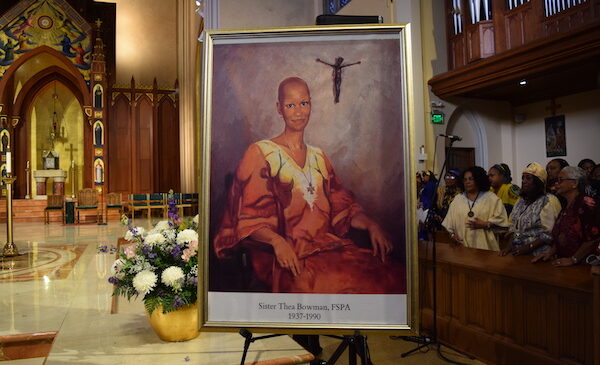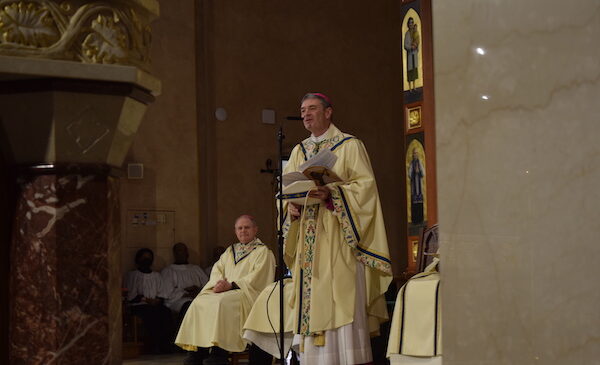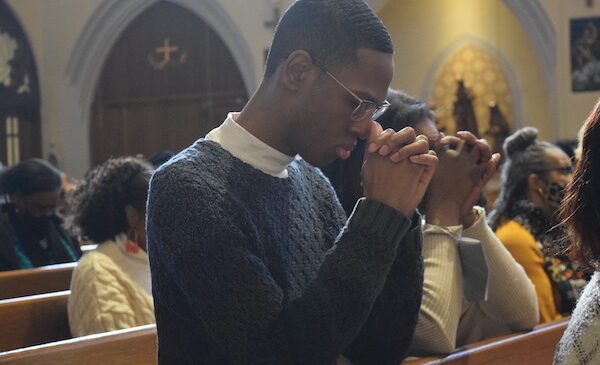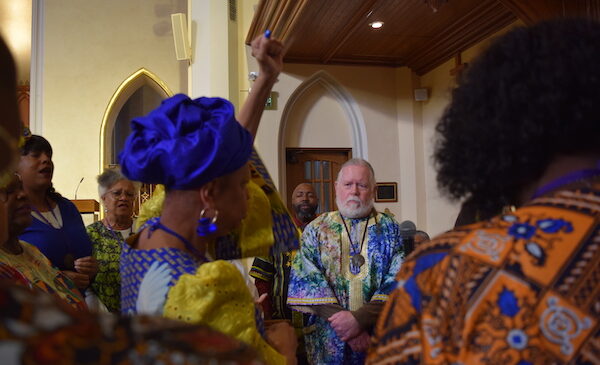ROCKVILLE CENTRE — As Loretta Lucas scanned St. Agnes Cathedral on Feb. 11, she couldn’t help but smile at what she saw — predominantly black faithful in a predominantly white church.
“When I came in here today, I said, ‘Thank God we’re bridging the gap,’ ” said Lucas, a parishioner at Our Lady of Refuge Catholic Church in Brooklyn who often tunes into St. Agnes Cathedral Mass broadcasts.
Lucas traveled to the Rockville Centre cathedral for the annual Mass of Thanksgiving in Celebration of Black History Month, put on by the Diocese of Brooklyn Vicariate of Black Catholic Concerns and the Diocese of Rockville Centre Office of Multicultural Diversity.
The Sister Thea Bowman Mass Gospel Choir set the tone with passionate vocals and colorful dress. Bishop Robert Brennan was the celebrant, with Josephite Father Anthony Bozeman, the academic dean at St. Joseph’s Seminary in Washington, the guest homilist.
Bishop Brennan was joined on the altar by Auxiliary Bishop Robert Coyle of Rockville Centre, as well as black clergy from both dioceses. In a way, the Mass was a homecoming for Bishop Brennan. He was ordained both a priest and a bishop at St. Agnes Cathedral.
Speaking with The Tablet after the Mass, Bishop Brennan highlighted the importance of the dioceses coming together for different causes, like Black History Month, because they can each contribute in a unique way.
“Each diocese has its own set of gifts and talents to contribute to the whole, and one of the hallmarks of the Church is our collaboration in ministry, our working together,” he said. “Getting the two dioceses together … we increase the joy, you might say, by working together.”
From the pulpit, Father Bozeman delivered an impassioned message on the importance of celebration for how far Black Catholics have come and the work that still needs to be done for the Church to be truly inclusive. His words garnered applause and shouts of “Amen!” throughout.
Speaking with The Tablet, Father Bozeman said that the Church needs to understand Black Catholic history in order to grow, explaining that history shows Catholics — regardless of race — are “all a part of the same family.”
“If you don’t know your family, how can you love them? How can you help them?” Father Bozeman asked. “Until the Church recognizes that all of us are many parts of this one body, we’ll never be truly Catholic.”
He and others at the Mass also emphasized the role dioceses “not can, but must” play in building up Black Catholic parishes and communities through respect, education, and funding.
“Respect is the first thing to realize that a lot of people don’t know the history of pain and struggle,” Father Bozeman said. “We’ve been in the Church since the beginning, so don’t think we’re an appendage. We’re coming fully gifted, and you as a Church have got to be able to, in order to be a Catholic Church, welcome all of our giftedness and work together.”
Darcel Whitten-Wilamowski, director of the Diocese of Rockville Office of Multicultural Diversity, said it’s imperative for dioceses to listen to the needs and perspectives of young Black Catholics and to educate them about Black Catholic history so progress doesn’t “stagnate” and they can carry on the work of the Black Catholic ministers before them.
Whitten-Wilamowski, who founded the Sister Thea Bowman Mass Gospel Choir more than 30 years ago, added that progress will be difficult without funding.
“We need funds in order to be able to bring the best that’s out there into the dioceses so that they can help us with our young people, and if this happens, you could find priests, you could find sisters,” she said. “We cannot allow the stagnation that has begun, and that is going on with our young people, to continue.”
Victor Antoine Jr., who participated in the Mass with the Knights of Peter Claver, said the Church needs to grow and become more inclusive. He said the Feb. 11 Mass was a reminder that Black Catholics are active Church members.
“This is an expression for us to say, ‘we’re participants, we’re involved,’ ” Antoine said. “We have an active role in the growth of the Church, and that’s what this is all about.”
Bishop Brennan noted that Black Catholic history is a rich part of the Church’s legacy, adding that “there are lessons that we need to learn from that legacy.
“Some painful reminders within that history, examples of either racism or neglect, and those are things we have to learn from, atone in a spiritual way for and really work harder and harder to see the dignity of every human person,” Bishop Brennan said.




